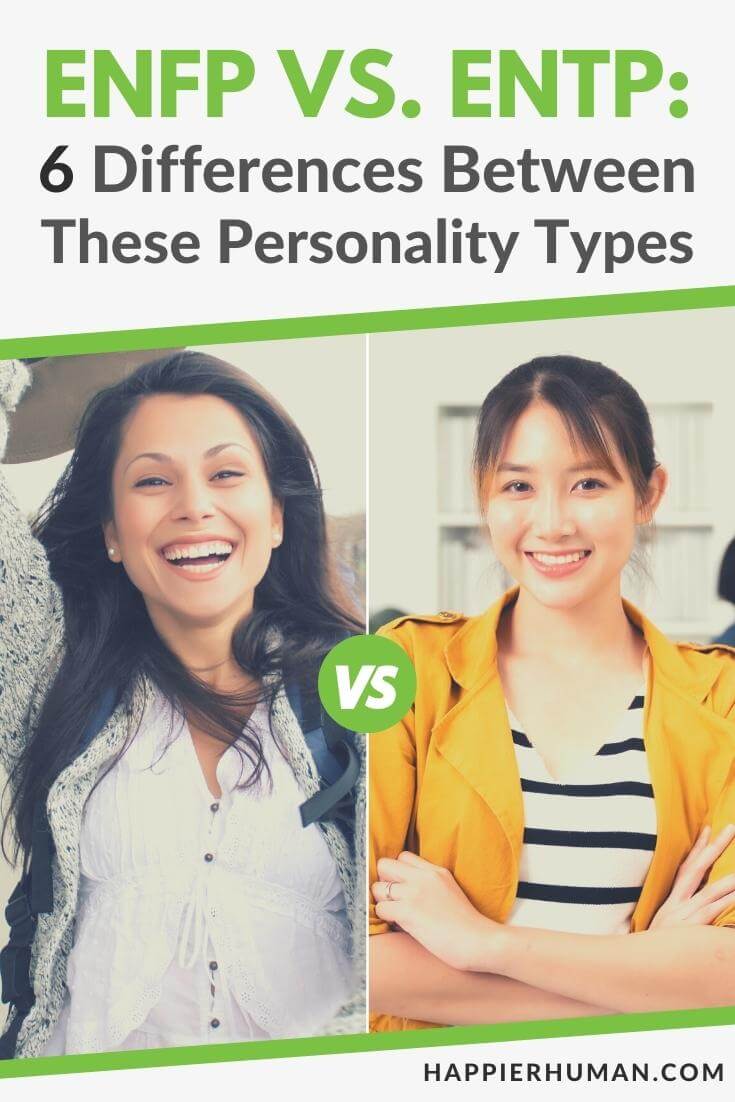There might be affiliate links on this page, which means we get a small commission of anything you buy. As an Amazon Associate we earn from qualifying purchases. Please do your own research before making any online purchase.
In the realm of personality types, it is relatively common for extroverted perceivers to also be feeling types, promoting cooperation and harmony, and using empathy as a guide.
However, they are less likely to be thinkers, focusing on logic and consistency rather than cooperation and harmony. This isn’t the only difference between ENFP vs. ENTP personality types; read on to learn more.
What Is the ENFP Personality Type?
The ENFP personality is called the Campaigner. They are motivated by big ideas and ideals, filled with hope and optimism for the future. The ENFP preferences are:
Extroverted
The first preference indicates where people tend to direct and receive their energy. Extroverts prefer to channel their energy outward toward people, activities, and sensations in the external world.
Extroverts are energized by activity and interactions with others. Extroverts discover their ideas and beliefs through their behaviors and sometimes act without planning.
INtuiting
The second psychological preference indicates the way a person prefers to receive information. An intuiting person pays more attention to information patterns, impressions, and underlying meaning.
They learn by thinking things through and exploring the implications of new information. They mentally explore symbols, theories, and abstractions and remember ideas and concepts better than factual details.
Feeling
The third preference indicates the way a person prefers to make decisions. A feeling person makes decisions by considering the perspectives and opinions of everyone involved to create a harmonious outcome.
They want to deeply understand the feelings of those around them and reach a peaceful resolution, knowing that no two situations will have the same solution because other people and different feelings will be involved.
Perceiving
The final preference indicator refers to how a person deals with the outside world. A perceiving person prefers to remain flexible and spontaneous, allowing events to unfold around them.
They want to understand, adapt, and interact with the world rather than structure and control it. Therefore, they are casual about their activities, keep planning to a minimum, and keep their options open.
A Campaigner is outgoing, optimistic, and energetic, eager to have a good time and work toward a greater purpose and impact on the world. They are imaginative, curious, enthusiastic, and charismatic. They are also independent and willing to take risks, often innovators in their chosen field.
The ENTP's great people skills and big goals make them inspiring leaders. Still, their creativity and flexibility sometimes distract them from new ideas and inspiration, and they struggle to follow through on long-term plans and goals.
What Is the ENTP Personality Type?
The ENTP personality has earned the nickname of the Debater, a type with tremendous mental agility who enjoys a theoretical discussion so much they may switch sides to keep it going. The main characteristics of an ENTP are:
Extroverted
The first preference indicates where people tend to direct and receive their energy. Extroverts prefer to channel their energy outward toward people, activities, and sensations in the external world.
Extroverts are energized by activity and interactions with others. Extroverts discover their ideas and beliefs through their behaviors and sometimes act without planning.
INtuiting
The second psychological preference indicates the way a person prefers to receive information. An intuiting person pays more attention to information patterns, impressions, and underlying meaning.

They learn by thinking things through and exploring the implications of new information. They mentally explore symbols, theories, and abstractions and remember ideas and concepts better than factual details.
Thinking
The third preference indicates the way a person prefers to make decisions. A thinking person makes decisions based on facts and data, striving for objectivity. They try to reach decisions that are universally applicable and useful all the time in every similar situation. They look for fundamental truths, underlying principles, and consistent practices without personal influence.
Perceiving
The final preference indicator refers to how a person deals with the outside world. A perceiving person prefers to remain flexible and spontaneous, allowing events to unfold around them.
They want to understand, adapt, and interact with the world rather than structure and control it. Therefore, they are casual about their activities, keep planning to a minimum, and keep their options open.
The Debater has a quick wit and a curious, open mind. They are deeply interested in understanding the systems and processes in their lives and the underlying principles that govern them. They are unconventional and analytical, and their extroverted nature seeks to explore these ideas in conversation with others.
As you might expect, this love of debate can sometimes become argumentative and challenging because the ENTP is also highly confident and will accept a challenge.
The willingness to challenge norms can make an ENTP extremely innovative, and their intelligence, energy, and charisma win them many friends.
What Do ENFP and ENTP Personalities Have in Common?
ENFP and ENTP personalities are energetic, charismatic, and outgoing. In fact, these two personalities have quite a lot in common and are superficially similar. Here are the most important things that ENFP and ENTP personality types have in common.
1. Imaginative
ENFP and ENTP personalities have agile, creative minds filled with ideas and possibilities. This creative imagination makes them innovative but can sometimes make them restless and dissatisfied with their present situation.
2. Influential
The bright, extroverted personalities of ENFP and ENTPs win them many friends, but their keen minds and excellent communication skills make them very persuasive and influential. They are
3. Disorganized
ENFP and ENTP personality types are spontaneous and flexible, preferring to let experiences unfold naturally rather than making and pursuing step-by-step plans. Unfortunately, this can make them disorganized and unreliable and inhibit their ability to accomplish long-term goals and plans.
A typical ENFP personality is the fictional character James T Kirk from Star Trek: he is charismatic, creative, and motivated by values and principles. However, he’s also independent, spontaneous, and a bit of a risk-taker.
Contrast that with famous ENTP comedian Jon Stewart, who is also intelligent, independent, and values-driven but is much more logical, analytical, and prone to verbal debate and argument.
6 Key Differences Between the ENFP and ENTP Personality
Although these personality types are similar in many ways, they also have some key differences that separate them. Here are the 6 biggest differences between ENFP vs. ENTP personality types:
1. Personality Type Frequency:
ENFP: 6-8% overall. ENTP: 2-5% overall
The ENFP and ENTP personality types are both fairly uncommon, but the ENFP type is more common among American women (8-10%), while the ENTP is more common among American men (3-7%)
2. Emotional vs. Logical
Emotional: ENFP. As a feeling personality type, the ENFP is more sensitive and emotional. They are sensitive to and aware of the feelings of others, and their empathy allows them to sense emotions that may be beneath the surface.
They are also mindful of their own emotions and able to articulate and express their feelings with others. They believe that how people feel is an essential aspect of a situation.
Logical: ENTP. An ENTP is often insensitive to their own or other people’s emotions. They also believe that feelings and emotions often need to be set aside to look at situations rationally and logically. They strive for objectivity, so they are likelier to ignore or dismiss feelings as irrelevant and unimportant.
3. People-Pleasing vs. Argumentative
People-pleasing: ENFP. The typical ENFP very much wants the affection and approval of others. This can make them avoid conflict to the point of unhealthy people-pleasing behaviors. As a result, they sometimes struggle to be truthful when facing unpleasant interactions or to maintain healthy boundaries with others.
Argumentative: ENTP. An average ENTP is deeply interested in the conceptual principles and underlying meaning of experiences. As extroverts, they like to explore these ideas out loud, in conversation with others, and are willing to probe, question, and challenge the ideas of others.
Unfortunately, they are sometimes so interested in these conversations that they don’t realize that they have become argumentative and are making other people uncomfortable.
4. Harmonious vs. Perfectionist
Harmonious: ENFP. The ENFP personality works toward supporting the happiness and well-being of everyone around them, actively promoting peace and harmony. They strive to make decisions that involve group compromise so everyone can get what they want, understand the perspectives of everyone around them, and create cooperative environments.
Perfectionist: ENTP. Most ENTPs work toward creating an ideal situation that is fair and equitable for everyone. They try to eliminate emotion and bias so that everything can be balanced and rational. But, of course, real life seldom lives up to this ideal, and these personalities can respond by being critical and perfectionist when things fall short of their goals.
5. Fun vs. Witty
Fun: ENFP. The warm, outgoing ENFP wants everyone to have fun in the present moment and enjoys creating events and activities that are enjoyable for all. Their love of groups of people and dynamic activities, along with their promotion of harmony and cooperation, make them entertaining friends.

Witty: ENTP. An ENTP is more likely to be funny than fun. However, their quick wit, keen insight, and verbal skills make them excellent conversationalists and witty companions, and they can be highly entertaining.
6. Enthusiasm vs. Passion
Enthusiasm: ENFP. The present-focused ENFP is incredibly enthusiastic and gets as caught up in the ideas of others as they get caught up in their own ideas.
They are always interested in the next idea or activity, provide enthusiastic support, and are easily excited. On the other hand, they may be a bit flighty, always getting caught up in the next thing instead of following through on the previous thing.
Passion: ENTP. An ENTP is more likely to be passionate than enthusiastic, getting caught up in activities and goals that align with their sense of purpose and values.
They aren’t as eager to get caught up in whatever other people are doing and more likely to dedicate themselves to a single objective. They may still be disorganized and lack follow-through, but they are more single-minded.
Final Thoughts on the ENFP and ENTP Personalities
ENFP and ENTP personalities are charismatic, dynamic, and interesting, making them highly influential to the people around them. They naturally connect with others and often easily rise to leadership positions.
In addition, the ENTP's love of debate and argumentation is often an asset in different situations, while the peace-loving ENFP creates cooperation and harmony toward shared goals.
If you know an ENFP or ENTP or are one yourself, you know these personality types are a bit special and stand out from the crowd. To learn more about Myers-Briggs, and the 16 basic personalities, check out our beginner's guide.
Finally, if you want to identify YOUR personality type, then take one of these 11 personality tests to better understand what makes you tick.


